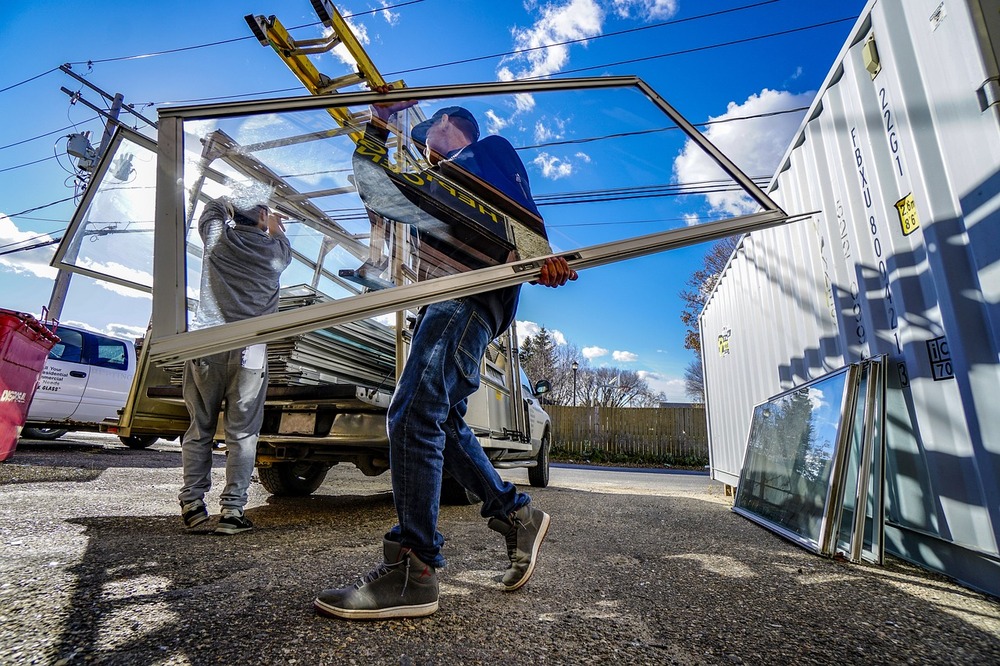Choosing energy-efficient windows is important to ensure that your gorgeous windows not only offer places to stand and take in the view but also ensure year-round comfort.
3 Energy-Efficient Window Considerations
Read on for some considerations for choosing the best energy-efficient windows for your home.
Consideration #1: Frame Material
The frame material of your windows matters for energy efficiency for two reasons: insulation and sealing. The best energy-efficient windows will have a frame material that insulates well and creates a strong seal when closed.

Wood | Low Energy Efficiency
Wood was often used as a window frame material before technological advances made manmade frame materials more commercially available. While wood window frames can be beautiful and give a home a charming, cottage look, they are not energy-saving. Wood does not insulate as well as other frame materials, nor does it create as good of a seal. Wood is porous and will absorb moisture, which can lead to swelling and shrinking. This can affect the ability of the window to close tightly and completely, letting out the air-conditioned or heated air.
Aluminum | Medium Energy Efficiency
Aluminum is a common window frame material, found in homes and buildings dating back to the 1930s. While it is an improvement on wood, aluminum is not considered highly energy-efficient as a window frame material. This is because it, as a metal, is conductive, meaning that it conducts heat—either into or out of your home—rather than insulating.
Fiberglass, Vinyl, and Composite | High Energy Efficiency
Fiberglass, vinyl, or composite material window frames are the best for energy efficiency currently available. These materials don’t deform easily and create a strong seal when your windows are closed, and they insulate well, keeping your heat in on cold days and cool air in on hot ones.
Consideration #2: Glass Type
There are several types of window glass available on the market. Each type has unique properties that make it suitable for different applications and environments.

Single-Pane Windows | Low Energy Efficiency
Single-pane windows (also referred to as “single-glazed”) are windows that feature only one layer of glass. Single-pane windows were once the most common type of window — and were, in fact, the only type of window available until the 1960s. Single-pane windows can still be found in many un-remodeled homes and buildings built before 1970, though they are used more infrequently today because they are inefficient.
Double- and Triple-Pane Windows | Medium-High Energy Efficiency
Double-pane or double-glazed windows are made with two layers of glass that trap a barrier layer of air that helps to insulate. Triple-pane / triple-grazed windows (you guessed it) are made with three layers of glass.
Double- and triple-pane windows are more energy efficient than single-pane windows because they allow less heat or cold to escape. Glass does not have a high R-value, meaning that it doesn’t insulate well. Doubling or tripling up on glass means that the insulating power of the window increases while maintaining transparency.
Consideration #3: Coatings and Treatments
Window glass can be treated to make it more energy efficient. These treatments include Low-E (low emissivity) coatings and window tinting, among others.
Low-E Window Coating
Low-E window coatings work by blocking ultraviolet (UV) and infrared light—which comes into or out of the home as heat—from passing through the glass, but still allowing visible light to pass through. The coating lowers the emissivity, or the ability to emit heat, of the glass.
Window Tinting
Window tinting can also make windows better from an energy efficiency standpoint. Like Low-E coatings, tinted window glass or tinted window films block solar heat from passing through the window and heating your home.
The Best Energy-Efficient Window Brands at Zeeland Lumber & Supply
There are many window manufacturers who create attractive, energy-efficient windows. We carry some of these brands at Zeeland Lumber & Supply, including:
Andersen® Windows
Andersen® is a leader in the industry, and their Fibrex frame material, made of recycled and reclaimed wood and vinyl, is energy-efficient and high-performing.
Jeld-Wen
Rated one of Newsweek’s 2023 Most Trustworthy Companies in America, you can feel confident in Jeld-Wen’s window selection. Products are available in a range of materials, styles, and levels of energy efficiency.
Marvin
Marvin is best known for its fiberglass windows and doors. Starting as a family-owned company over a hundred years ago, they’ve grown into a leading choice of manufacturer for builders and homeowners alike.
North Star
North Star’s vinyl windows are all manufactured with energy-efficient low-E glass. They also offer heat-saving triple-paned window options.
Ready to put energy-efficient windows in your home? Zeeland Lumber offers a variety of window styles and materials that balance energy efficiency, function, and aesthetics. We carry windows from leading brands and can refer professional installation services. Get in touch today to learn about our energy-efficient window offerings and find the best windows for your home.


